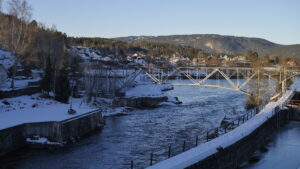Resource Anticipation amid Geopolitical Unrest
Resource Anticipation amid Geopolitical Unrest: The Discovery of Rare Earth Elements in Norway
Critical raw materials (CRM) are in escalating demand and considered key for transitioning away from fossil fuels. Among the CRMs are Rare Earth Elements (REE) used for manufacturing magnets that go into wind turbines and solar panels, among other. With China being the dominant producer of REE, the question of how to foster and secure EU supply has gained urgency, resulting in new regulations, including the CRM Act that aims to promote the extraction and manufacturing of CRM within Europe.
Amid the geopolitical scramble for CRM, EU’s largest reserve of REEs was recently discovered in the Norwegian town of Ulefoss, an old mining town located in the region of Telemark. With the mineral discovery, the town has gained national and international attention, and mineral companies are conducting exploration activities and seeking investments, with the ambition of creating the world’s most sustainable mine. In and around Ulefoss, discussions are now emerging: What would the world’s most sustainable mine look like? What would it mean for local industry? How can there be a balance between economic development, national and European security and environmental protection, and what might be the long-term consequences of this endeavour?
Against this background, the research project explores the following:
- How do speculations and anticipation of REE extraction, its potentials and impacts, inform the actions and agendas of international institutions, government officials, companies, civil society organisation and local communities?
- How are sustainability trade-offs anticipated, utilised, discussed and negotiated by stakeholders across levels, and how do discourses of the green energy transition impact new mining developments?
The project is based on ethnographic methods, including interviews, participant observation, document analysis and archival research. It combines international and national politics and local developments, contributing to a deeper understanding of the cross-scalar impacts of resource anticipation and speculation, along with new insights into the implications of recent CRM strategies in Europe.
The project is conducted by Anna Frohn Pedersen and funded by Fritz Thyssen Stiftung
